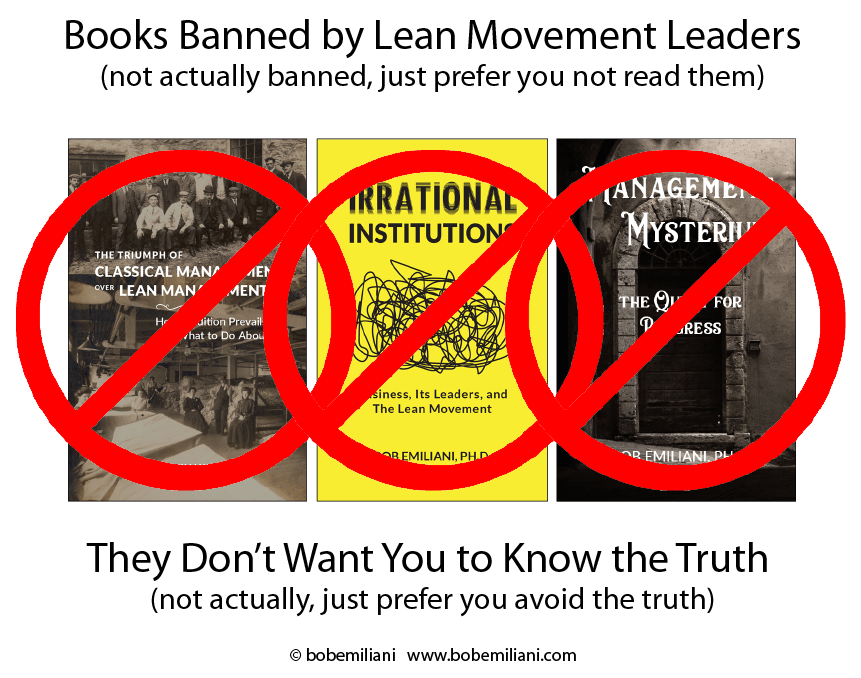Business is not known to be a citadel of truth-telling. Bargaining, salesmanship, exaggeration, misstatements, omission, flattery, puffery, and deception are common in the conduct of business. Leaders commonly analogize business to war or sports, but business may be closer to the card game poker. In both poker and business, bluffing, misdirection, concealment, duplicity, and the like are accepted practice. Lying is a structural feature of poker and business, not a defect, due to distrust that is inherent in both activities. As such, they aid in their “normal” function. To not engage in these behaviors would be seen as naïve, a disturbing violation of social norms, and the fast track to losing. Their intention — this “art of business” — is to gain an advantage, usually at someone else’s expense and possibly to great detriment. Generally, conservative businesspeople need to be liberal when it comes to truth-telling to preserve personal and company interests.
Lean management became a business decades ago and, being a business, entered the realm of truth-bending that is characteristics of business enterprise. Thousands of people have entered the business of Lean as owners or part-owners, and a few have been absorbed into publicly traded corporations. Whether someone whose business depends in some way upon Lean bends the truth or not is up to their discretion. But suffice it to say that the temptation is always there and far more likely to be accepted than not. It’s just business. Is it morally and ethically acceptable? Like many such quandaries, it depends.
When it comes to Lean management, maybe it is more than “just business.” Because of the “respect for people” principle, and recognition of the existence of waste and need to eliminate it, Lean people hold themselves to a higher standard of thinking and behavior than others who are committed to classical management. Or at least they believe they do. And they also think they are part of a higher ideal, a movement whose mission is to serve the greater good. Logically, Lean people selling Lean would refrain from bargaining, salesmanship, exaggeration, misstatements, omission, flattery, puffery, deception, bluffing, misdirection, concealment, and duplicity. But perhaps the higher ideal and higher standard, in an odd way, creates greater incentives for the thinking and behaviors that disrespect people. Lean is seen to have a legitimate claim on honesty, truth, facts, goodness, and rightness such that the ends can justify the means. And, according to the honored preconceptions of 17th and 18th century classical and neoclassical economics that remain embedded in Lean people’s mind, the “art of business” (force and fraud) is nothing more than maximizing one’s economic value by doggedly pursuing one’s self-interest.
Let’s face it, who among us — those who profit from Lean in one way or another, whether their book of business is millions of dollars per year or a few hundred dollars per month — has not engaged in bargaining, salesmanship, exaggeration, misstatements, omission, flattery, puffery, deception, bluffing, misdirection, concealment, and duplicity? Does our higher calling excuse us from the problems or harm that may come from our efforts to prevail in the business outcomes that we seek?
The image below is an advertisement for my trilogy of books which explain why business leaders resist or reject lean management. The advertisement illustrates a casual relationship with the truth whose purpose is to grab people’s attention and induce them to buy the books. The words “Books Banned by Lean Movement Leaders” and “They Don’t Want You to Know the Truth” are obviously lies because that has not happened. These words contain elements of salesmanship, exaggeration, and deception. The parenthetical words are clarifications — logical deductions based on the fact that no leading Lean movement figure has endorsed the books despite the fact that they are clearly groundbreaking works that answer questions that have been around for more than 120 years (and which readers have found highly illuminating, e.g., “…as impactful as Ohno’s Workplace Management and Deming’s The New Economics“). The lack of endorsement by the titans of Lean business reflects elements of concealment, omission, misdirection, and deception to facilitate salesmanship of their own goods and services. You could call this free market competition, or you could call it morally and ethically tenuous in relation to our shared goal of advancing Lean management.

Lean management has a credibility problem driven primarily by the fact that Lean transformation is very difficult to achieve both cognitively and technically (qualitatively and quantitatively). There are innumerable examples of continuous improvement, but remarkably few examples of Lean transformation over the last 30 or 40 years. And so, the promise of Lean was and remains much greater than what has been achieved in actual practice. To the extent that bargaining, salesmanship, exaggeration, misstatements, omission, flattery, puffery, deception, bluffing, misdirection, concealment, and duplicity are invoked to sell Lean management, it probably works to its disadvantage by further undermining or diminishing Lean’s credibility.
What do you when something as useful and important as Lean management suffers from declining credibility and, inevitably, declining interest? It seems there are three options:
- Continue with business-as-usual selling Lean until revenues decline to the point of closing the business (or merging to survive a while longer)
- Wait for a crisis of such a magnitude that business leaders are forced to adopt Lean management
- Engage in problem-solving to strengthen and intensify Lean’s appeal.
Option 1 is most likely, Option 2 seems least likely, while Option 3 is a sound choice consistent with the raison d’etre of Lean. Lean management is inseparable from the business of Lean because top business leaders do not naturally gravitate to Lean management. If lying is a structural feature of business, part of its system of rules, then how does Lean’s claims on facts, truth, and higher standards operate in a realm where it is, or required to be, something that must rely on selling to grow its base of skilled practice by business leaders? Are we locked in a conundrum?
